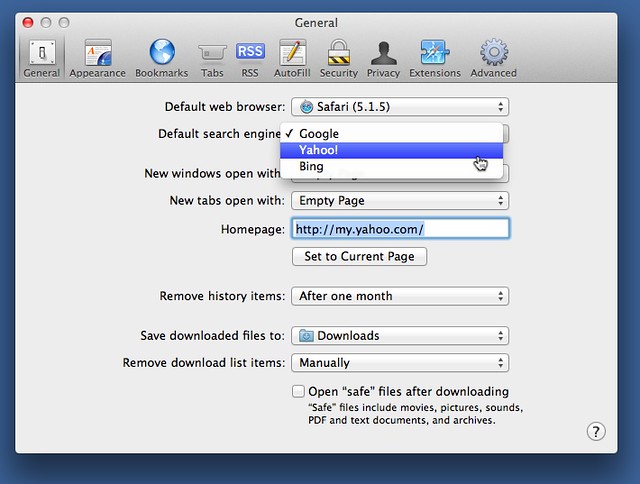DuckDuckGone
April 27, 2012 at 9:45 PM by Dr. Drang
In an attempt to be like all the cool people, I started using DuckDuckGo as my search engine a few months ago. And, as you can tell from the title, I’ve stopped using it and gone back to Google.
The rush to DuckDuckGo was largely driven by Google’s announcement that it was going to pool the user information it has through various sources. Instead of treating, for example, the info gathered through your searches, the info gathered by reading your GMail, and the info gathered from your YouTube viewings as separate data streams—which is what it had been doing—Google was going to combine all this into one big dossier on you, the better to deliver perfectly pitched, irresistible ads. Many people were upset by this and decided to distance themselves from Google a bit.
I wasn’t upset. I was surprised by the announcement, but only because I had assumed that Google already pooled all its information sources.
Switching your search engine to DuckDuckGo was one of the most popular methods of limiting contact with Google. Safari makes changing the search engine easy, but only if you want to use Google, Yahoo!, or Bing.
The folks at DuckDuckGo came up with a clever solution in which you
- Choose Yahoo! as your search engine in the Safari preferences.
- Add a line to your
/etc/hostsfile that directed any queries tosearch.yahoo.comto DuckDuckGo’s IP number instead.
After taking these steps, any query in the Safari search field goes to DuckDuckGo. Unfortunately, the background text in the search field still says “Yahoo!” but you can’t have everything.
I set myself up like this and used DuckDuckGo for over two months, but eventually decided it just wasn’t for me.
The first, and probably least important, reason for me to switch back was its speed. DuckDuckGo is noticeably slower than Google. Even those who’ve switched to DuckDuckGo and like it mention its speed as a downside. This is usually phrased as “It’s not as fast as Google, but that doesn’t bother me.” My translation: “It’s distinctly slower than Google, but I’m willing to live with that.” This is a reasonable position; if I were otherwise happy with DuckDuckGo, I’d be willing to put up with its pokiness, too.
The main reason I’ve switched back is that I prefer Google’s results. DuckDuckGo doesn’t give that mix of regular links, links to news stories, and links to images that a typical Google search gives. It’s easy to say “If I want links to images, I’ll ask for them,” but I find getting image links along with regular links to be helpful more often than not (news links, I admit, are usually just noise to me). This is, obviously, a matter of taste and depends strongly on the types of searches you do. All I can say is that I was grateful to have the images mixed in with my regular results when I switched back to Google.
One of DuckDuckGo’s main selling points is its bang syntax. If you include, for example “!amazon” in the search, it’ll use Amazon’s internal site search tool to find matches. The result will be as if you went to Amazon first and made the query in its search field. In the same way, you can initiate searches at Apple (!apple), Macworld (!macworld), Daring Fireball (!df), Stack Overflow (!so), and so on. DuckDuckGo has hundreds of these words or abbreviations that’ll perform a site-specific search.
This sounds great, but I found two problems with the bang searches. First, many internal search tools suck. Apple’s, for instance. I’ve almost always found better results by using Google with “site:apple.com” than searching with Apple directly. Second, with so many of these site-specific searches, I found myself often using one of the bang words (without the bang) in my queries. When this happens, DuckDuckGo—trying to be helpful—tells me that I should try the search with the bang. But it isn’t helpful, it’s just page litter. With a few exceptions—!amazon, !youtube, and !m (Google Maps) come to mind—I almost never want to do a site-specific search, and I wish DuckDuckGo would just shut up about it. There is, unfortunately, no way to turn this “help” off.
I would never discourage anyone from using DuckDuckGo—undoubtedly, its results are a perfect fit for some people. I’m glad I gave it a thorough trial, and I’m glad to be back with Google.


